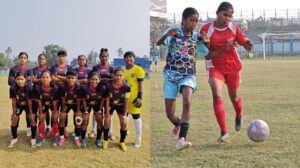
Rohan Chowdhury
The inaugural season of the Empowerment Cup has been running successfully for the last five days at the Bhawanipore Club Dakshineswar Young Men Association Ground. In fact, across ten matches so far, the tournament has delivered both spectacular goals and deeply inspiring stories.
Not a single match has ended in a stalemate. The packed winter-afternoon crowds have been treated to high-quality football, and the energy across the ground perimeter has matched the intensity on the field.
While Bengal teams such as United Kolkata Sports Club, Gayeshpur Football Academy and SSB Siliguri have shown promising performances, it is the visiting teams from Ranchi and Odisha that have truly stamped their authority.
On Day 5, JSSPS Ranchi produced one of the most dominant displays of the tournament, defeating Adibashi Unite Shyamnagar 5–0. With the side consisting of players belonging to national camps in various age groups, the Ranchi side proved to be a formidable challenge for the academy team from Bengal.
But behind the on-field dominance lies a deeper story. JSSPS coach Somnath Singha shared why tournaments like this matter. “All these players come from very humble and backward backgrounds. Most of their families have little or no knowledge of sport,” he said.
He added that the Jharkhand Government’s initiatives under the JSSPS programme — where over ten sports are coached, and children receive stipends — have been crucial in shaping young talent. “Tournaments like the Empowerment Cup are a great platform. Kolkata is the hub of football and performing well here opens multiple doors for these players.”
Interactions with many of the girls after matches reveal another reality: Limited exposure has made them extremely camera-shy. Off the field, most hesitate to speak, often responding with soft one-word answers. But once the whistle blows, the same players transform — loud, commanding, demanding the ball, or chasing down opponents with fierce determination.
“I don’t know what to say,” has perhaps been the most common response when approached for an interview.
And this is exactly why the Empowerment Cup is important. It gives young athletes — especially those who barely get competitive match time through the year — a stage to grow, express themselves, and gain confidence. Only a small fraction of players get to feature in the Indian Women’s League or IWL 2, making tournaments like this vital for their development.
India’s FIFA panel referee Pranjal Banerjee echoed the sentiment. “Being here at the ground feels great,” he said. “The girls don’t get match time and such tournaments provide a real platform. The fact that so many teams have traveled from outside Bengal shows the rising interest from across the country.”
As the tournament approaches its business end, with every passing day, the interest has grown. Teams have sent their officials to monitor the other games in order to analyse their possible opponents beforehand.
The first edition of the Empowerment Cup has already shown why grassroots platforms matter. Beyond the scorelines and standout performances, the tournament is helping young girls discover confidence, identity and opportunity through football.
For many of them, this is more than just a competition — it is a rare window to be seen, to grow and to dream bigger. If the past five days act as indicators, the Empowerment Cup is not just nurturing talent, but shaping the future of women’s football in India; one match and one young athlete at a time.
Follow Revsportz for latest sports news
